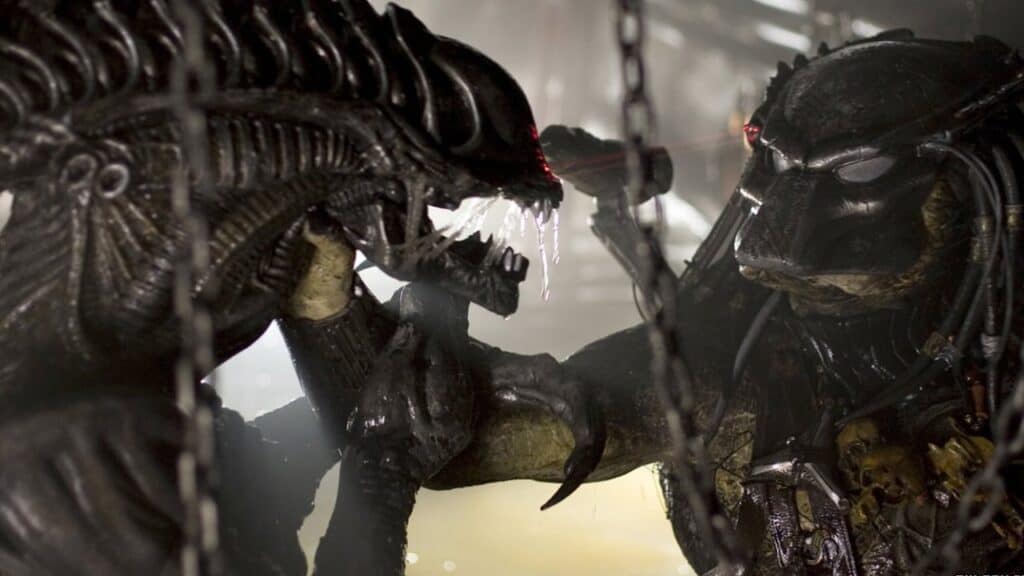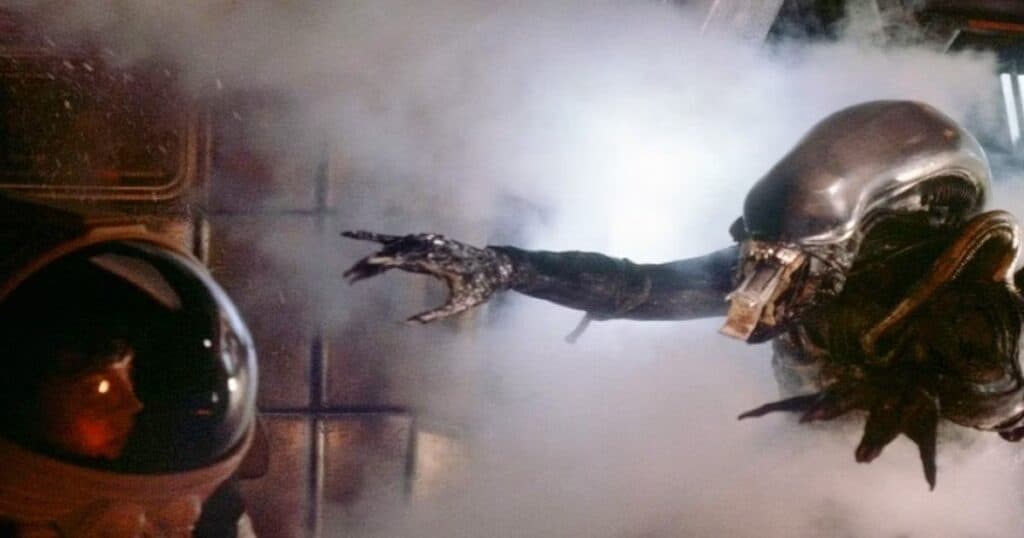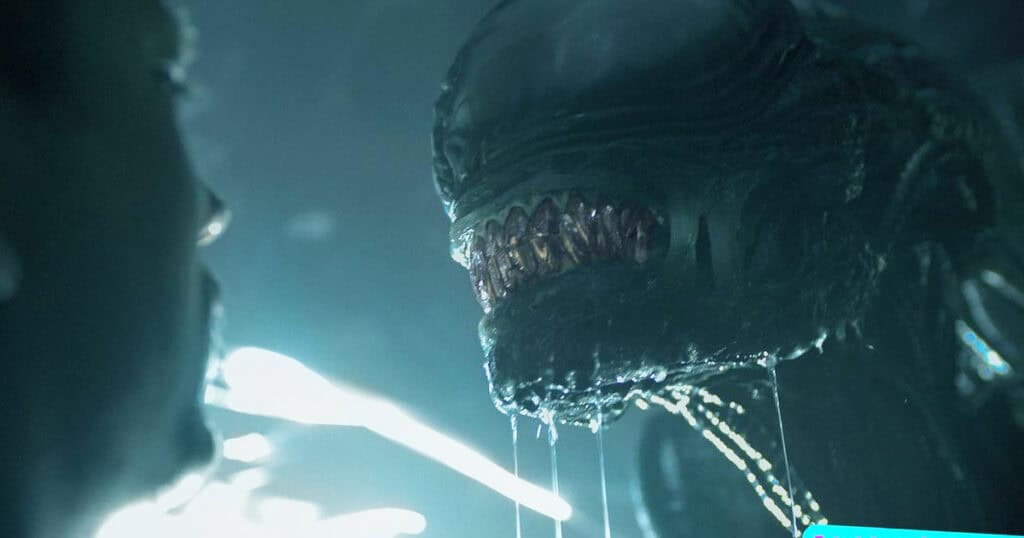Last Updated on August 26, 2024

For four films in a row, the timeline of the Alien franchise was very straightforward, with each sequel picking up where the previous movie left off… but then things got a bit more complicated, with the addition of prequels, a mid-quel, and even a couple of crossovers that don’t appear to be canon to the other movies. So we have decided to try to clear up the confusion and put together a list on How to Watch the Alien Franchise in Chronological Order. Here we go…

ALIEN VS. PREDATOR (2004)
As mentioned, the Predator crossovers aren’t acknowledged in the Alien films that followed; in fact, the prequels try their best to contradict them. But if you’re looking to watch these movies in an order based on the timeline, this is where you start, because it’s set in 2004 (and the unrated cut has a prologue that takes place in 1904). While previously released Alien movies had made a big deal about the characters not allowing the xenomorph creature to reach Earth, director Paul W.S. Anderson reveals they’ve had a long history on Earth. He gives a Chariots of the Gods / ancient astronauts twist to the Predator species, telling us the Predators have been coming to Earth for thousands of years and had a hand in building humanity’s ancient civilizations. And for as long as they have been coming to our planet, they’ve been bringing xenomorphs with them. Worshipped as gods by the people they came in contact with, the Predators would choose humans to have the honor of letting a facehugger implant a xenomorph in their chest. The chestbursters would come ripping out of them, and then the Predators would hunt down the xenomorphs in a rite of passage. This would happen every 100 years – and in 2004, it happens again. The latest Predator xenomorph hunt takes place in a pyramid (the first pyramid ever built) that lies 2000 feet below the surface of Bouvetøya Island, which sits 1000 miles off the coast of Antarctica. There may not have been people around to incubate the xenomorphs this time if a Weyland Industries satellite hadn’t noticed a heat bloom on the island (that was the pyramid’s inner workings firing up, awakening a dormant alien Queen so she could start pumping out facehugger eggs), inspiring the company’s terminally ill founder Charles Bishop Weyland (Lance Henriksen) to lead an expedition out there. Some questionable decisions went into the making of this film. I don’t think anyone ever expected an Alien vs. Predator movie to be set on modern day Earth or to claim that xenomorphs have been on the planet many times before… but I do like the idea that the xenomorphs are a species that have existed for a long time, people just never came in contact with them (outside of Predator hunts) because they exist out in deep space. That’s all we ever needed to know, but the prequels disagreed.

ALIENS VS. PREDATOR: REQUIEM (2007)
The second film to watch when going through xenomorph films in chronological order is the crossover sequel Aliens vs. Predator: Requiem, which was released in 2007 but still takes place in 2004 because it picks up right where its predecessor left off. A Predator ship takes off from Antarctica, but doesn’t make it far before a “Predalien” hybrid that was incubating in a Predator corpse is born and gets loose on the ship – which also happens to have a bunch of facehuggers stored in jars on board. The ship crashes in the wilderness on the outskirts of the small town of Gunnison, Colorado, and soon there are xenomorphs – along with the Predalien – running loose through the town, with a highly skilled Predator hunting them down. Fox overcompensated for Alien vs. Predator being PG-13 by making the R-rated follow-up as mean-spirited and nasty as possible, then released it with such a dark picture you can barely ever see what’s happening. What’s happening often involves characters you might wish weren’t in the movie, like a pregnant women in a maternity ward and a bullied pizza boy. In the final moments, a piece of Predator gear is delivered to business woman Ms. Yutani (Françoise Yip), and that was supposed to be a set-up for the leaps in technology that occur between the events of this film and the Alien movies that are set in the future. By examining Predator technology, Earthlings find a way to venture further out into space, where they’ll run into more xenomorphs.

PROMETHEUS (2012)
Now we get to the futuristic settings the Alien franchise is truly known for – but only after we’re witness to a scene set at the dawn of time, when a giant, humanoid alien from a race referred to as the Engineers lands on Earth, ingests some kind of liquid that causes his body to break down, and collapses into a river. By doing this, he has kick-started the birth of humanity. After decades away, original Alien director Ridley Scott returned to series with a strong sense of ownership, an intense interest in an android character named David (Michael Fassbender), and a wrongheaded belief that it was time to move away from the xenomorphs, even though he also wanted to examine how the xenomorphs came into being. In the process, he decided to show us how Earth got started as well. The majority of Prometheus takes place in 2093, a time of deep space travel, hypersleep chambers (that allow others to view the dreams of the people in stasis), holographic displays, self-propelled Parameter Uplink Spectagraph mapping devices, and AI-powered androids who can pass as human. Like Alien vs. Predator, the story is inspired by the Chariots of the Gods / ancient astronauts theory, but this time we get Engineers instead of Predators and people have discovered a star map that points them toward a distant moon that’s capable of sustaining life, LV-223. Engineers might be found there. Peter Weyland, the very old founder of Weyland Corporation (played by Guy Pearce under unconvincing makeup), has funded a trillion dollar expedition to LV-223 on board a ship called Prometheus. Discovered on LV-223 are the corpses of Engineers that have been dead for a couple thousand years, dangerous critters, one living Engineer, evidence that they were planning to wipe out the Earth, and a black goo biological weapon that starts causing some of the scientists in the group to undergo horrific mutations. A mural seen on LV-223 may or may not indicate that xenomorphs and facehuggers already exist (they could be different variations of the species), but they’re not in this movie. Instead, we get things called a trilobite and a deacon, which aren’t nearly as cool.

ALIEN: COVENANT (2017)
Ridley Scott wanted to make a trilogy of Alien prequels. The second chapter in that unfinished trilogy, Alien: Covenant, is set in 2104, eleven years after the events of Prometheus. A ship called Covenant, which has 2000 colonists and 1140 embryos on board and is on the way to a place called Origae-6, runs into trouble when it’s still seven years from its destination. The captain dies in his stasis pod during a turbulent ride – so, when the crew picks up a transmission of someone singing a John Denver tune coming from a previously overlooked habitable planet that seems even more promising than Origae-6, they decide to check it out. And discover that this world is a playground for android / mad scientist David, who has spent a good amount of time messing with that black goo. This world was inhabited by Engineers, until David launched a biological warfare attack on them and wiped out all of the non–botanical lifeforms. While destroying life, he’s also creating life through his experiments, which result in neomorphs – which infect human hosts through airborne spores and then emerge as backbursting and mouthbursting creatures – and ovomorphs, which function more like traditional xenomorphs and end up as praetomorphs. As far as Scott is concerned, David is the creator of the xenomorph, but some fans like to hold on to the idea that he wasn’t the creator, he was just making variations of a creature that had already existed. That’s what I would like to believe. If Scott had made his trilogy capper, it would have involved David battling vengeful surviving Engineers, would have returned to the Alien setting of LV-426, and would have moved on from xenomorphs into a story “taken over by AIs.” With David being so prominent in these two prequels, he was almost there – and Alien: Covenant even shows David interacting with a look-alike android called Walter, kissing and playing the flute with him. But Alien: Covenant wasn’t well-received, Disney purchased Fox, and the story of David’s takeover was set aside.

ALIEN (1979)
Five movies into this list, we finally reach a truly great film. Director Ridley Scott’s 1979 classic is set in the year 2122 – and when Scott circled back to make prequels, he did not keep in mind that tech in Prometheus and Alien: Covenant should be less advanced than what was seen in Alien. Instead, it looks much more advanced, so when you watch the movies in chronological order now, it appears that things went backwards between films, with the fancy, holographic displays and flat screen monitors being replaced with tube monitors and clunky, noisy machines. One thing that has improved is android tech, as this movie features an android who, unlike David and Walter in the prequels, is able completely pass as just another human. The crew members on the commercial towing vehicle Nostromo aren’t even aware there’s an android in their midst until a shocking reveal late in the running time. (A reveal that, judging by his later contributions to the franchise, Scott seems to have felt was the most fascinating thing about the movie.) The xenomorph and the stages of its life cycle are introduced when the Nostromo computer system picks up a transmission from a supposedly uninhabited moon. Even though the ship is carrying 20 million tons of mineral ore back to Earth, the crew (which includes Sigourney Weaver as franchise heroine Ellen Ripley) has to re-route because it’s Weyland-Yutani company policy to investigate any transmissions that indicate intelligent origin. On the moon, they discover an alien spaceship with a dead Engineer pilot and a cargo hold full of facehugger eggs. Things go downhill for the Nostromo crew from there – and honestly, I would not recommend watching these movies in chronological order if it’s your first time going through the franchise. Alien will be a much more effective viewing experience if you watch it first. The xenomorph is scarier if you haven’t already seen it fight Predators or watched its knock-offs bounce around the screen in the prequels.

ALIEN: ROMULUS (2024)
For nearly forty years, chronological viewing would have required watching Alien and Aliens back-to-back. But then Fede Alvarez came along and decided to make a movie that slots in between them, taking place in 2142, 20 years after the events of Alien – and thankfully, Alvarez and his crew were paying attention to the way tech looked in Alien and Aliens, making sure this “mid-quel” fits right in with them. The tube monitors and the clunky, noisy machines are back! Work stations resemble what was seen in Alien, and when we get a glimpse of a mining colony, it resembles what we saw in Aliens… although this place is a bleak hellhole. It’s run by Weyland-Yutani, and the company’s not only questionable when it comes to decisions concerning xenomorphs. They’re also terrible employers who refuse to let miners leave the colony. To earn a travel permit, employees have to reach a quota that requires many years of work, and the quota can be increased without notice. The story centers on a group of people who want to escape to a planet that’s nine years away – but to make the trip, they’ll have to steal some hypersleep chambers from an abandoned space station that’s drifting near the colony planet, about to crash into the planetary rings. Unfortunately for them, this space station was the site of xenomorph experimentation that went predictably wrong, so they find themselves fighting for survival against alien beasts. Alvarez carried some of Scott’s “androids tinkering with xenomorph DNA” ideas over from the prequels, and the best character of the movie is Andy (David Jonsson), a damaged and obsolete android who was plucked out of the trash and programmed to be a dedicated companion to miner / heroine Rain (Cailee Spaeny).

ALIENS (1986)
Poor Ripley. She survived that alien encounter on the Nostromo, but her problems were just getting started. Director James Cameron reveals that her escape pod was drifting through space (with her on board in hypersleep) for 57 years before she’s finally located (in 2179), waking up to learn that her young daughter lived her entire life and passed away while mom was drifting and sleeping. When she tells her employers at Weyland-Yutani what happened, they inform her that the moon her crew found the derelict spaceship on, LV-426, is now the site of a terraforming colony. And they send some colonists out to look for the spaceship. Unfortunately, they find it, and the colony falls, overrun by facehuggers and xenomorphs ruled by a huge alien Queen. When Weyland-Yutani loses contact with the colony, they send a bunch of Colonial Marines, a company rep, and the most beloved android in the series, Lance Henriksen as Bishop (this is why Henriksen was brought back to play Charles Bishop Weyland in AVP) to check it out, with Ripley agreeing to serve as advisor. And once they reach LV-426, it turns out to be a battle for survival that the Marines weren’t quite prepared for. Cameron built on the things Ridley Scott had previously showed us and expanded the world, giving us a look at how colonies operate, equipment like the Power Loader and the Daihotai tractor, military vehicles like the Bug Stomper and the Armored Personnel Carrier M577, and weaponry: the M41A Pulse Rifle, the M240 Incinerator Unit, the M56 Smartgun, the UA 571-C Automated Sentry Gun. It’s all incredibly cool to look at, and it surrounds a great bunch of characters.

ALIEN³ (1992)
Alien 3 had the most difficult development process of any of the films. Fox and the producers had a lot of trouble figuring out how to follow up the crowd-pleasing success that was Aliens. Multiple scripts were written and rejected… and the cobbled-together one that ended up being brought to the screen by beleaguered first-time feature director David Fincher gave us a dark, nihilistic heartbreaker of a movie. There was no thought given to pleasing crowds with this one, as is evident from the opening sequence that kills off the characters who survived Aliens with Ripley. Picking up immediately after the events of Aliens, Alien 3 quickly reverses that film’s happy ending and crash-lands Ripley on the planet Fiorina “Fury” 161, which is both a mineral ore refinery and a correctional facility for antisocial male prisoners. So we have Ripley stuck in this filthy place, surrounded by convicted rapists and murderers, while another xenomorph (birthed from either a dog or an ox, depending on which cut you watch) runs loose in the refinery / prison. And there are no weapons to use against it. With the Bishop android busted, there’s not much in the way of tech, either. But that doesn’t stop Lance Henriksen from getting a scene or two. This is an incredibly bleak movie; abandon all hope before you watch this one.

ALIEN: RESURRECTION (1997)
Jump ahead more than 200 years, to 2381. Although Sigourney Weaver only agreed to do Alien 3 because Ripley was being killed off, when a fourth movie came along, she agreed to come back and play Ripley again… sort of. Although Weyland-Yutani no longer exists (they were bought out by Walmart), the United Systems Military is just as interested in the xenomorph as W-Y ever was, and on board the medical research vessel USM Auriga they have made multiple attempts to clone Ellen Ripley because they’ll also be cloning the alien Queen embryo in the process. So here we have Weaver playing Ripley 8, the latest and first successful attempt to clone Ripley and extract the Queen from her torso. Although she appears to be a grown woman, she has the mind of a child and has to be educated all over again. Still, the fact that she now has alien in her DNA has made her stronger and faster and given her acidic blood. She also has some memories left over from her previous life and a telepathic connection to the xenomorphs… so when the aliens get loose on the USM Auriga and Ripley has to fight alongside a group of mercenaries (and yet another android, this one played by Winona Ryder) to survive and make sure the xenomorphs won’t reach Earth (again), Weaver is able to give a different, stranger performance as this Ripley. She doesn’t quite react to things in the same way the original Ripley would have. And the original Ripley never had to face a creature as weird as the human/alien hybrid known as the Newborn. Directed with quirky style by Jean-Pierre Jeunet, Alien: Resurrection has a goofball sense of humor that doesn’t generally go over very well with viewers, but some enjoy it as a comic book-style adventure.
And with that, we have reached the end of Alien franchise timeline. The last thing we see when watching this series is the Ripley 8 clone making her way back to Earth, more than 250 years after Ellen Ripley departed from the planet. We don’t get to see what Earth is really like in 2381 (Paris doesn’t appear to be doing very well), but we hope Ripley 8 was able to make a good life for herself there.
Originally published at https://www.joblo.com/alien-franchise-in-chronological-order/



